
-
Find the right food for your petTake this quiz to see which food may be the best for your furry friend.Find the right food for your petTake this quiz to see which food may be the best for your furry friend.Health CategoryFeatured products
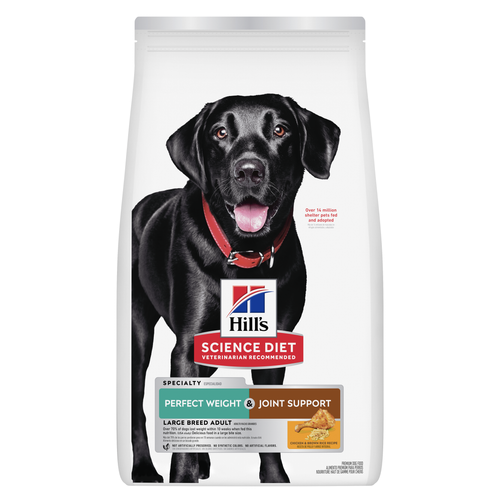 Perfect Weight & Joint Support Large Breed Chicken & Brown Rice Recipe Dog Food
Perfect Weight & Joint Support Large Breed Chicken & Brown Rice Recipe Dog FoodThis weight management and mobility support dog food was created with Hill’s unique understanding of the biology of overweight dogs
Shop Now Adult Salmon & Brown Rice Recipe Dog Food
Adult Salmon & Brown Rice Recipe Dog FoodSupports lean muscle and beautiful coat for adult dogs
Shop Now Adult 7+ Healthy Cuisine Roasted Chicken, Carrots & Spinach Stew Dog Food
Adult 7+ Healthy Cuisine Roasted Chicken, Carrots & Spinach Stew Dog FoodDelicious roasted chicken paired with tender vegetables in a succulent stew
Shop NowFeatured products Adult Salmon & Brown Rice Recipe Cat Food
Adult Salmon & Brown Rice Recipe Cat FoodSupports lean muscle and beautiful fur for adult cats
Shop Now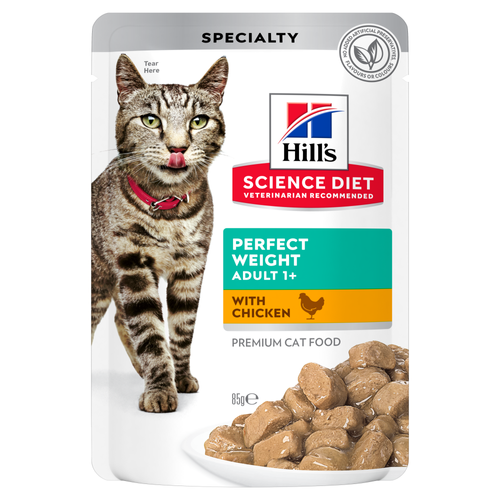 Adult Perfect Weight with Chicken Cat Food
Adult Perfect Weight with Chicken Cat FoodBreakthrough nutrition for your cat’s healthy weight maintenance and long-lasting weight support
Shop Now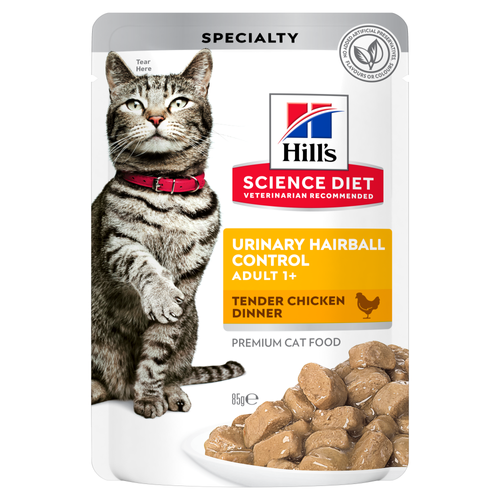 Adult Urinary Hairball Control Tender Chicken Dinner Cat Food
Adult Urinary Hairball Control Tender Chicken Dinner Cat FoodPrecisely balanced nutrition to support urinary health from kidney to bladder. With natural fibre technology to help reduce hairballs.
Shop Now -
DogCat
- Cat Tips & Articles
-
Health Category
- Weight
- Skin & Food Sensitivities
- Urinary
- Digestive
- Kidney
- Dental
- Serious Illness
-
Life Stage
- Kitten Nutrition
- Adult Nutrition
Featured articles Pet Food Storage Tips
Pet Food Storage TipsWhere you store your cat and dog food can make a big difference in the quality and freshness once it is opened. Here are some common questions and recommendations for optimal storage for all of Hill’s dry and canned cat and dog food.
Read More Water
WaterWater is the most important nutrient of all and essential for life. Animals can lose almost all their fat and half their protein and still survive, but if they lose 15% of their water, it will mean death.
Read More The Right Diet For Your Pet
The Right Diet For Your PetLearn what to look for in healthy pet food & nutrition, including ingredients, quality of the manufacturer, your pet's age, and any special needs they have.
Read More -


Weight Management in Cats
Did you know that obesity affects more than 50 percent of America's pet population? If your cat is overweight, she can develop all kinds of health problems such as painful arthritis, heart disease, breathing difficulty, diabetes and even bladder cancer. For your cat, the excess weight and the resulting health problems can mean less play time and depression.
How can you tell if your cat is overweight? First, your veterinarian will weigh your cat at her regular check-ups. Between checkups, place your hands on her side - are her ribs hard to feel or even impossible to feel? If so, she is likely overweight.
There are many easily identifiable causes of weight gain in cats:
Overfeeding: Cats with unlimited access to food understandably eat more than they need.
Overeating: Many commercial foods are loaded with salt and fat. This improves taste, which means your cat will want to gorge.
Feeding habits: Feeding table scraps and "people food" can lead to obesity.


Tasty Tips
Lack of exercise: Too much food and too little exercise produces a typical result: obesity.
Age: Older, less active cats are prone to weight gain.
Gender: Female cats are more likely to become overweight.
Neutering: Spayed or neutered cats are twice as likely to become obese due to a more sedentary lifestyle. (There are many important health reasons to have your pet spayed or neutered - just remember to monitor your cat's weight.)
Food plays a very important role in treating an overweight cat. Along with exercise, a low-fat and low-calorie food is essential in helping your cat lose weight and stay fit. Fiber is also a key ingredient since it helps your cat eat less while keeping her full.
Once your cat has been overweight, she may be prone to weight gain and should have an ongoing weight-management plan based on good nutrition, exercise and regular check-ups and weigh-ins.
For an accurate diagnosis and treatment options, always consult your veterinarian.
Related products

Precisely balanced nutrition to support urinary health from kidney to bladder. With natural fibre technology to help reduce hairballs.

Supports lean muscle and beautiful fur for adult cats
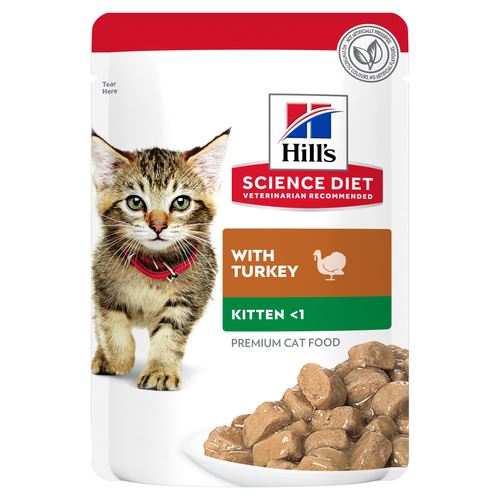
Delicious turkey chunks in gravy with omega-3 fatty acids for eye health and brain development in kittens, and high-quality protein to support muscle growth. Balanced levels of minerals for strong bones and teeth.

Breakthrough nutrition for your cat’s healthy weight maintenance and long-lasting weight support
Related articles
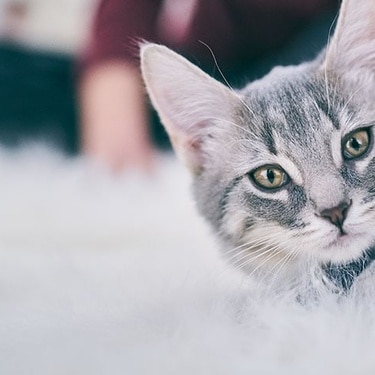
HillsPet Nutrition provides information on proper nutrition, fitness and special needs in keeping your cat healthy and happy.

Get helpful information on proper feline oral healthcare and why it's so vital to take care of your cat's teeth.
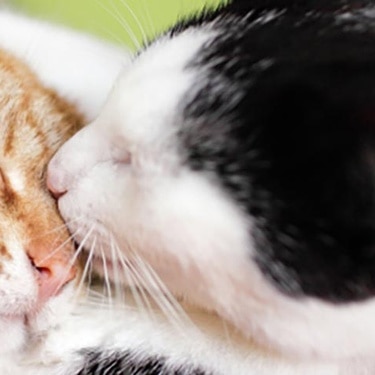
Being overweight puts a cat at risk for developing many serious health issues. Weight gain indicates an increase in body fat and usually results when your cat eats too much and exercises too little.
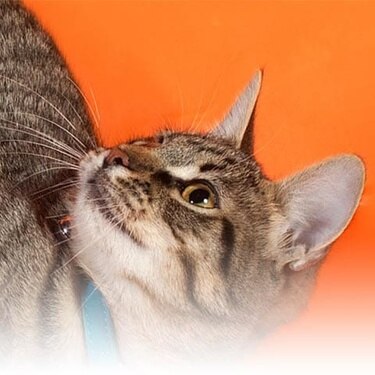
As a responsible pet owner you owe it to yourself and your cat to understand problems associated with overweight cats.

Put your cat on a diet without them knowing
Our low calorie formula helps you control your cat's weight. It's packed with high-quality protein for building lean muscles, and made with purposeful ingredients for a flavorful, nutritious meal. Clinically proven antioxidants, Vitamin C+E, help promote a healthy immune system.
Put your cat on a diet without them knowing
Our low calorie formula helps you control your cat's weight. It's packed with high-quality protein for building lean muscles, and made with purposeful ingredients for a flavorful, nutritious meal. Clinically proven antioxidants, Vitamin C+E, help promote a healthy immune system.


